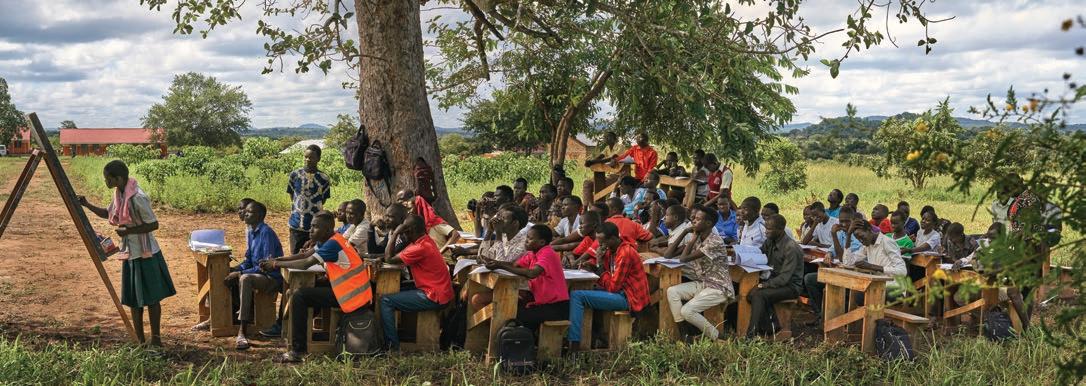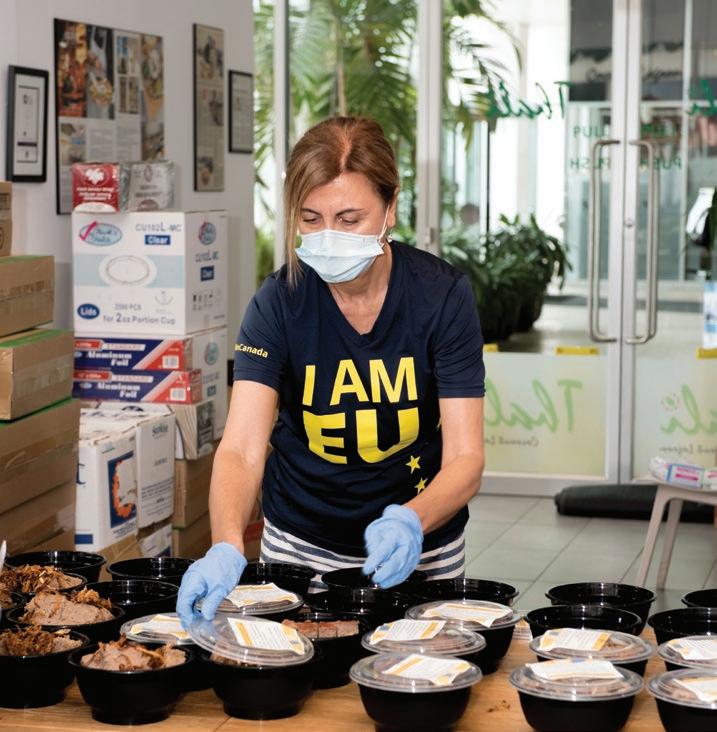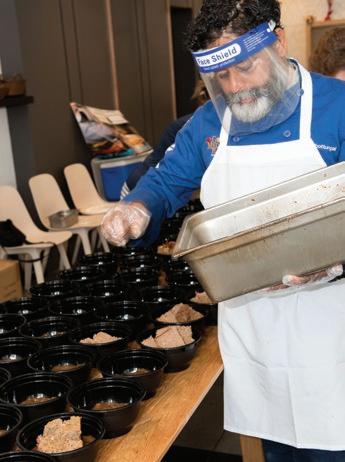
6 minute read
Notes from the Field: War Child's virus response in Uganda
COVID-19 changes everything for War Child
By Nikki Whaites
Advertisement
Education is still closed in Uganda. This overcrowded “classroom” shows the problem with reopening schools.
The COVID-19 pandemic represents an existential threat to countries already responding to the consequences of war and conflict. In particular, displaced people and host communities all over the world are at heightened risk as the virus continues to spread. Uganda, for example, hosts more than 1.4 million refugees, making it the largest refugeehosting country in Africa and the thirdlargest in the world. A serious outbreak of COVID-19 would be devastating in this context.
Our staff at War Child tell us that the atmosphere in the refugee settlements is tense. Many who used to go back and forth to neighbouring South Sudan are now cut off. News of the death rates in the rest of the world is terrifying for those forced to live in cramped conditions.
As with all countries, Uganda is taking firm measures to help prevent the further spread of the disease. This includes closing all schools and higher education establishments until further notice, closing all non-essential businesses, restricting movement and preventing gatherings of more than five people. As necessary as these actions are, they are having a terrible impact on children’s education and on family livelihoods.
With the imposition of this lockdown, War Child’s programs for refugees could not continue as they had operated previously. Our accelerated learning programs (ALP), which allow children to quickly catch up on missed education, cannot now function in classrooms. Our youth training has been postponed due to socialdistancing rules. And our community engagement work, which relied on large group meetings, is on hold.
However, our team has found innovative solutions to keep children learning and youth-led businesses afloat. Rather than closing down ALP, War Child, which has its headquarters in Toronto, has adapted it to an at-home learning model, so children do not fall further behind while schools are closed. It has also developed ways to mentor and advise youth-led enterprises remotely, to help them adapt their business models to be responsive to the needs of their communities in the face of the crisis. And they have found contactless means of bringing information on the crisis to refugee communities.
To raise awareness and help people reduce the spread of the virus, our team uses public service announcements on radio, printed materials, billboard posters and SMS and WhatsApp messaging to deliver advice to more than 800,000 people. The team will also be establishing 120 community handwashing stations and distributing hygiene kits containing soap, facemasks and sanitizer, to 12,000 vulnerable households.
War Child is also working with community members to identify small local businesses in need of support and provide them micro-loans of up to $500. In addition, it will provide these business owners with advice and support to identify alternative approaches to reaching their customers. This could be through internet sales, home delivery and contactless pickup. This will be done remotely to limit contact and abide by social-distancing rules.
Refugee children have had their education repeatedly interrupted and the COVID-19 lockdown is yet another major blow. There’s a need for innovative solutions. War Child will be distributing home-learning materials to 18,000 children and is working with other educational organizations to collect and adapt existing radio education materials that align with the curriculum. These will be broadcast on local and national radio stations.
War Child is also working with the National Curriculum Development Centre to explore ways existing curriculum materials could be digitized and translated into a radio-based format.
The situation is fluid and War Child will need to be flexible as it tracks the pandemic’s progress. This is a worrying time for its staff in the field, and its team is taking every precaution to ensure the safety of frontline workers. But for the children and families War Child serves, COVID-19 is potentially a disaster on top of the existing catastrophe of war and displacement. We must all do everything we can to keep the virus from spreading in these fragile communities. If we are truly in this together, we need a global response to this pandemic.
Europeans do a good turn during COVID lockdown
In an effort to highlight their unity and solidarity with European values, several of the embassies from EU member states, along with the EU delegation, volunteered for Food for Thought on Europe Day.
“Europe Day is on May 9,” Brice de Schietere said in a statement about the event. “It had to be different this year in the current context and we wanted to highlight unity and solidarity as strong European values. We discussed this with the ambassadors of the EU member states and agreed that we should express this solidarity through local engagement in support of communities in need.”
Food for Thought, which receives support from the Community Foundation of Ottawa, is a not-for-profit corporation that feeds people, encourages community spirit and ensures people are connected by internet and phone.
Part of the organization’s mission is to run a coffee shop out of a community centre on Caldwell Avenue in the Carlington neighbourhood of Ottawa.
“We have coffee and food — waffles and smoothies,” said Sylvain de Mar


Despite a fire at his east-end Coconut Lagoon restaurant, Joe Thottungal, above, has been offering Thali, his downtown restaurant, as a place to produce meals for Food for Thought.
gerie, managing director of Food for Thought. “It’s quite a hard neighbourhood and all social services carry banking
Caridad Vicen Enguita, assistant to the EU ambassador, helps package meals for Food for Thought as part of the embassy's unique way to celebrate Europe Day.
hours. They all close at 4 p.m., but most of the [Food for Thought’s clients] go to school or work. Also, the evenings are crime-recruitment time for youths. That’s when we open.”
When COVID hit, the coffee shop, which also offers phone and internet services to clients, had to close. Instead of just abandoning its mission, Food for Thought pivoted. For the first two months of the pandemic, it moved its volunteers into Joe Thottungal’s Thali restaurant on O’Connor Street in downtown Ottawa. Thottungal, an award-winning chef who is well known for his big heart, opened up his restaurant to the group, ran the kitchen and, with the help of community and chef volunteers, cooked 1,500 meals a day. The chef from the German Embassy took part, as did several diplomats from EU missions.
The new meal focus of Food for Thought is a positive result of COVID and one that will continue even after the café can reopen.
“There’s a huge number of people in Ottawa who are falling through the cracks,” de Margerie says, adding that he sees them regularly at the café. “A food hamper doesn’t help because they don’t have pots and pans. They can’t cook because they don’t have a kitchen.”
Diplomats from EU countries felt it was an ideal choice for them to mark Europe Day in unusual times.
“It is important to stress the fantastic job done by the volunteers in the field,” de Schietere writes. “We are very proud of our partners and the many generous people who all deserve credit.”
To mark Nelson Mandela Day in July, diplomats from the South African High Commission also volunteered their time at Thali with Food for Thought. D










